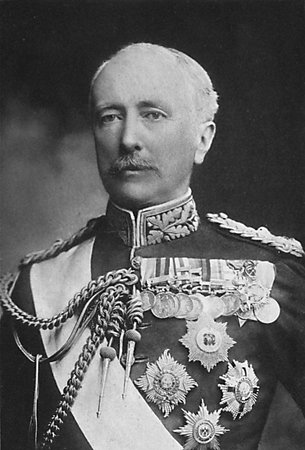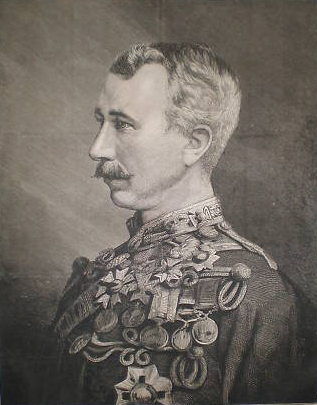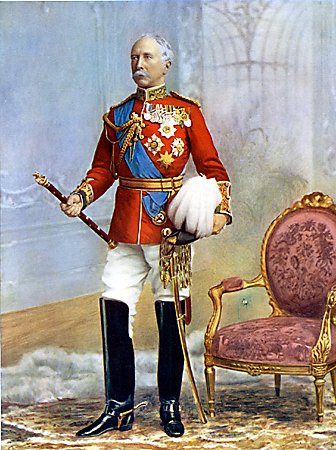<Back to Index>
- Commander - in - Chief of the Forces Field Marshal Garnet Joseph Wolseley, 1833
PAGE SPONSOR



Field Marshal Garnet Joseph Wolseley, 1st Viscount Wolseley, (4 June 1833 - 25 March 1913) was an Anglo - Irish officer in the British Army. He served in Burma, the Crimean War, the Indian Mutiny, China, Canada, and widely throughout Africa — including his Ashanti campaign (1873 - 1874) and the Nile Expedition against Mahdist Sudan in 1884 - 85. He served as Commander - in - Chief of the Forces from 1895 to 1900. His reputation for efficiency led to the late 19th century English phrase "everything's all Sir Garnet", meaning "all is in order."
Born the eldest son of Major Garnet Joseph Wolseley of "the King's Own Scottish Borderers" (25th Foot) and Frances Anne Wolseley (née Smith), Wolseley was educated in Dublin and first worked in a surveyor’s office.
He obtained a commission as an ensign in the 12th Foot on
12 March 1852
without purchase, in recognition of his father's service.
He then transferred to the 80th Foot on 13 April 1852,
with which he served in the Second Anglo - Burmese War.
He was severely wounded in the thigh on 19 March 1853 in
the attack on Donabyu, was mentioned in dispatches, and
received the war medal. Promoted to lieutenant on 16 May
1853 and invalided home, Wolseley transferred to the 84th
Regiment of Foot on 27 January 1854 and then to the
90th Light Infantry, at that time stationed in Dublin, on
24 February 1854. He was promoted to captain on 29
December 1854.
He accompanied the regiment to the Crimea, and landed at Balaklava in December 1854. He was selected to be an assistant engineer, and attached to the Royal Engineers during the Siege of Sevastopol. Wolseley served throughout the siege, where he was wounded at "the Quarries" on 7 June 1855, and again in the trenches on 30 August 1855, losing an eye.
After the fall of Sevastopol, Wolseley was employed on the quartermaster general's staff, assisting in the embarkation of the troops and supplies, and was one of the last British soldiers to leave the Crimea in July 1856. For his services he was twice mentioned in dispatches, received the war medal with clasp, the 5th class of the French Légion d'honneur and the 5th class of the Turkish Order of the Medjidie.
Six months after joining the 90th
Foot at Aldershot, he went with it in March 1857
to join the troops being dispatched for the Second Opium
War. Wolseley was embarked in the transport Transit
which was wrecked in the Strait of Banka - the troops were
all saved, but with only their personal arms and minimal
ammunition. They were taken to Singapore, and from there
were dispatched to Calcutta
on account of the Indian Mutiny.
Wolseley distinguished himself at the relief of Lucknow under Sir Colin Campbell in November 1857, and in the defense of the Alambagh position under Outram, taking part in the actions of 22 December 1857, of 12 January 1858 and 16 January 1858, and also in the repulse of the grand attack of 21 February 1858. That March, he served at the final siege and capture of Lucknow. He was then appointed deputy assistant quartermaster general on the staff of Sir Hope Grant's Oudh division, and was engaged in all of the operations of the campaign, including the actions of Bari, Sarsi, Nawabganj, the capture of Faizabad, the passage of the Gumti and the action of Sultanpur. In the autumn and winter of 1858 he took part in the Baiswara, trans - Gogra and trans - Rapti campaigns ending with the complete suppression of the rebellion. For his services he was frequently mentioned in dispatches, and having received the Mutiny medal and clasp, he was promoted to brevet major on 24 March 1858 and to brevet lieutenant colonel on 26 April 1859.
Wolseley continued to serve on Sir Hope Grant's staff in
Oudh, and when Grant was nominated to the command of the British troops
in the Anglo - French expedition to China of 1860,
accompanied him as the deputy assistant quartermaster
general. He was present at the action at Sin-ho, the
capture of Tang-ku, the storming of the Taku Forts, the
Occupation of Tientsin, the Battle of Pa-to-cheau and the
entry into Beijing (during which the destruction of the
Chinese Imperial Old
Summer Palace was begun). He assisted in the
re-embarkation of the troops before the winter set in. He
was mentioned, yet again, in dispatches, and for his
services received the medal and two clasps. On his return
home he published the Narrative of the War with China
in 1860.
He was given the substantive rank of major on 15 February
1861.
In November 1861, Wolseley was one of the special service officers sent to Canada in connection with the Trent incident. In 1862, shortly after the battle of Antietam, Wolseley took leave from his military duties and went to investigate the American Civil War. He befriended Southern sympathizers in Maryland, who found him passage into Virginia with a blockade runner across the Potomac River. He met the Generals Robert E. Lee, James Longstreet and Stonewall Jackson.
On 10 April 1892, the New Orleans Picayune published Wolseley's ten-page portrayal of Lieutenant General Nathan Bedford Forrest, which condensed much of what was written about Forrest by biographers of the time. This work appeared in the Journal of the Southern Historical Society in the same year, and is commonly cited today. Wolseley addressed Forrest's role at the Battle of Fort Pillow near Memphis, Tennessee in April, 1864 in which African - American USCT troops and white officers were alleged by some to have been slaughtered after Fort Pillow had been conquered. Wolseley wrote, "I do not think that the fact that one-half of the small garrison of a place taken by assault was either killed or wounded evinced any very unusual bloodthirstiness on the part of the assailants."
He became a brevet colonel on 5 June 1865 and Assistant Quartermaster General in Canada with effect from the same date. He was actively employed the following year in connection with the Fenian raids from the United States, and was appointed Deputy Quartermaster General in Canada on 1 October 1867. In 1869 his Soldiers' Pocket Book for Field Service was published, and has since run through many editions. In 1870, he successfully commanded the Red River Expedition to establish Canadian sovereignty over the Northwest Territories and Manitoba. Manitoba had entered Canadian Confederation as the result of negotiations between Canada and a provisional Métis government headed by Louis Riel. The only route to Fort Garry (now Winnipeg), the capital of Manitoba (then an outpost in the Wilderness), which did not pass through the United States was through a network of rivers and lakes extending for six hundred miles from Lake Superior, infrequently traversed by non-aboriginals, and where no supplies were obtainable. The admirable arrangements made and the careful organization of the transport reflected great credit to the commander, who upon his return home was made a KCMG on 22 December 1870 and a CB on 13 March 1871.
Appointed assistant adjutant
general at the War Office in 1871 he worked hard
at furthering the Cardwell
schemes of army reform.
In 1873, he commanded the expedition to Ashanti, and, having made all his arrangements at the Gold Coast before the arrival of the troops in January 1874, was able to complete the campaign in two months, and re-embark them for home before the unhealthy season began. This was the campaign which made him a household name in England. He fought the Battle of Amoaful on 31 January of that year, and, after five days' fighting, ending with the Battle of Ordashu, entered Kumasi, which he burned. He received the thanks of both houses of Parliament and a grant of £25,000 was promoted to brevet major general for distinguished service in the field on 1 April 1874, received the medal and clasp and was made GCMG on 31 March 1874 and KCB. The freedom of the city of London was conferred upon him with a sword of honour, and he was made honorary DCL of Oxford and LL.D of Cambridge universities. On his return home he was appointed inspector general of auxiliary forces with effect from 1 April 1874; however, in consequence of the indigenous unrest in Natal, he was sent to that colony as governor and general - commanding on 24 February 1875.
He accepted a seat on the council of India in November
1876 and was promoted to the substantive rank of major general on 1 October
1877.
Having been promoted to brevet lieutenant
general on 25 March 1878, he went as high
commissioner to the newly acquired possession of Cyprus on
12 July 1878,
and in the following year to South Africa to supersede
Lord Chelmsford in command of the forces in the Zulu War,
and as governor of Natal and the Transvaal and the High
Commissioner of Southern Africa. But, upon his arrival at
Durban in July, he found that the war in Zululand was
practically over, and, after
effecting a temporary settlement, he went on to the
Transvaal. He was promoted to brevet general while serving in
South Africa on 4 June 1879. Having reorganized the
administration there and reduced the powerful chief, Sikukuni, to submission, he
returned home in May 1880 and was appointed Quartermaster
General to the Forces on 1 July 1880. For his services in
South Africa he received the South Africa Medal with
clasp, and was advanced to GCB on 19 June 1880.
On 1 April 1882, Wolseley was appointed Adjutant General to the Forces, and, in August of that year, given command of the British forces in Egypt under Muhammad Ali and his successors to suppress the Urabi Revolt. Having seized the Suez Canal, he then disembarked his troops at Ismailia and, after a very short campaign, completely defeated Urabi Pasha at the Battle of Tel el-Kebir, thereby suppressing yet another rebellion. For his services, he received the thanks of Parliament and the medal with clasp, was raised to the peerage as Baron Wolseley, of Cairo and of Wolseley in the County of Stafford, and received from the Khedive the 1st class of the Order of Osminieh.
On 1 September 1884, Wolseley was again called away from his duties as adjutant general, to command the Nile Expedition for the relief of General Gordon and the besieged garrison at Khartoum. The expedition arrived too late; Khartoum had been taken, and Gordon was dead. In the spring of 1885, complications with Imperial Russia over the Panjdeh Incident occurred, and the withdrawal of that particular expedition followed. For his services there, he received two clasps to his Egyptian medal, the thanks of Parliament, and was created Viscount Wolseley, of Wolseley in the County of Stafford, and a Knight of St Patrick. He was given the substantive rank of general on 21 January 1887.
Wolseley continued at the War Office as Adjutant General to the Forces until 1890, when he became Commander - in - Chief, Ireland. He was promoted to be a field marshal on 26 May 1894, and appointed by the Conservative government to succeed the Duke of Cambridge as Commander - in - Chief of the Forces on 1 November 1895. This was the position to which his great experience in the field and his previous signal success at the War Office itself had fully entitled him. Field Marshal Viscount Wolseley's powers in that office were, however, limited by a new Order in Council, and after holding the appointment for over five years, he handed over the command - in - chief to his fellow field marshal, Earl Roberts, on 3 January 1901. He had also suffered from a serious illness in 1897, from which he never fully recovered. The unexpectedly large force required for South Africa, was mainly furnished by means of the system of reserves which Wolseley had originated; but the new conditions at the War Office were not to his liking, and, upon being released from responsibilities he brought the whole subject before the House of Lords in a speech.
He was Gold Stick in Waiting to Queen Victoria and took part in the funeral procession following the death of Queen Victoria in May 1901. Following her death, he was made Gold Stick in Waiting to King Edward VII.
In early 1901 Lord Wolseley was appointed by King Edward to lead a special diplomatic mission to announce the King´s accession to the governments of Austria - Hungary, Romania, Serbia, Turkey and Greece. During his visit to Constantinople, the Sultan presented him with the Order of Osmanieh set in brilliants.
He was admitted to the Order of Merit on 9 August 1902, and awarded the Volunteer Officers' Decoration on ll August 1903. He was also honorary colonel of the 23rd Middlesex Regiment from 12 May 1883, honorary colonel of the Queen's Rifle Volunteer Brigade, the Royal Scots (Lothian Regiment) from 24 April 1889, colonel of the Royal Horse Guards from 29 March 1895 and colonel - in - chief of the Royal Irish Regiment from 20 July 1898.
He died on 26 March 1913, at Menton on the French Riviera and was buried in the crypt of St Paul's Cathedral, London.
Wolseley was married in 1867 to Louisa (1843 - 1920), the daughter of Mr. A. Erskine. His only child, Frances (1872 - 1936) was an author and founded The College for Lady Gardeners at Glynde. She was heiress to the viscountcy under special remainder.
Wolseley was deeply opposed to Sir Edward Watkin's
attempt to build a Channel Tunnel. He gave evidence to a
parliamentary commission that the construction might be
"calamitous for England", he added that "No matter what
fortifications and defenses were built, there would always
be the peril of some continental army seizing the tunnel
exit by surprise." Various contrivances to satisfy his
objections were put forward including looping the line on
a viaduct from the Cliffs of
Dover and back into them, so that the connection
could be bombarded at will by the Royal Navy. All to no
avail, and over 100 years were to pass before a permanent
link was made.
A frequent contributor to periodicals, he also published The Decline and Fall of Napoleon (1895), The Life of John Churchill, Duke of Marlborough to the Accession of Queen Anne (1894), and The Story of a Soldier's Life (1903), giving, in the last named work, an account of his career down to the close of the Ashanti War.
In recognition of his success, an expression arose: "all
Sir Garnet" meaning; that everything is in good
order.
W.S. Gilbert of Gilbert & Sullivan deliberately modeled the character of Major General Stanley in the operetta The Pirates of Penzance on Wolseley, as did George Grossmith, the actor who first created the role in the opening theatrical run.
There is an equestrian statue of Wolseley on Horse Guards Parade in London.
Wolseley Barracks, at London, Ontario, is a Canadian military base (now officially known as ASU London), established in 1886. It is the site of Wolseley Hall, the first building constructed by a Canadian Government specifically to house an element of the newly created Permanent Force. Wolseley Barracks has been continuously occupied by the Canadian army since its creation, and has always housed some element of The Royal Canadian Regiment. At present, Wolseley Hall is occupied by The Royal Canadian Regiment Museum and the Regiment's 4th Battalion, among other tenants. The white pith helmet still worn as part of the full-dress uniform of The RCR is known as a Wolseley helmet. Wolseley is also a Senior Boys house at the Duke of York's Royal Military School.
Field Marshal Lord Wolseley is commemorated by a tablet at St Michael and All Angels Church in Colwich, Staffordshire, a short distance from Shugborough Hall and Wolseley Park at Colwich, near Rugeley. The church was the burial place of the Wolseley baronets of Wolseley Park, of whom Field Marshal Lord Wolseley was a distant relative.
The residential areas of Wolseley in Winnipeg, Manitoba, Canada, located in the west central part of the city and of Wolseley in Saskatchewan, Canada are named after him.